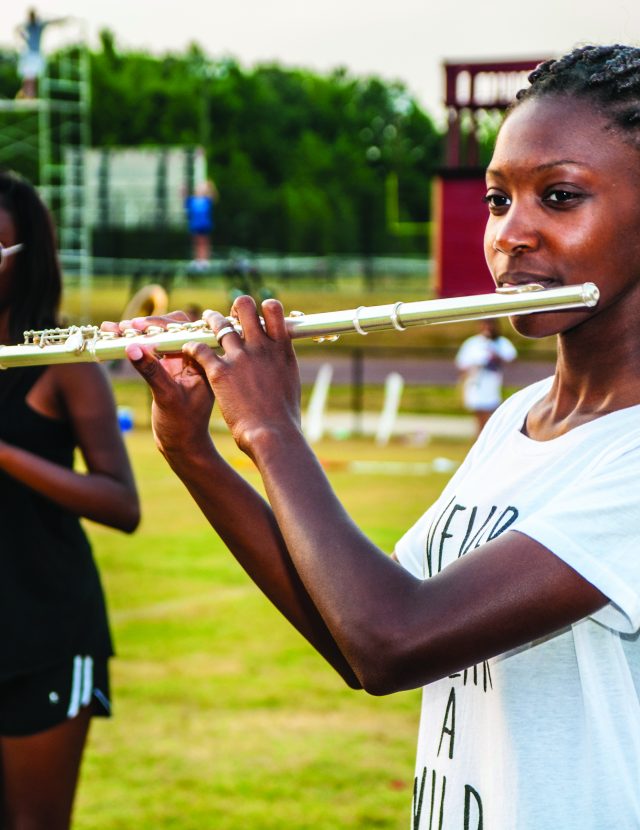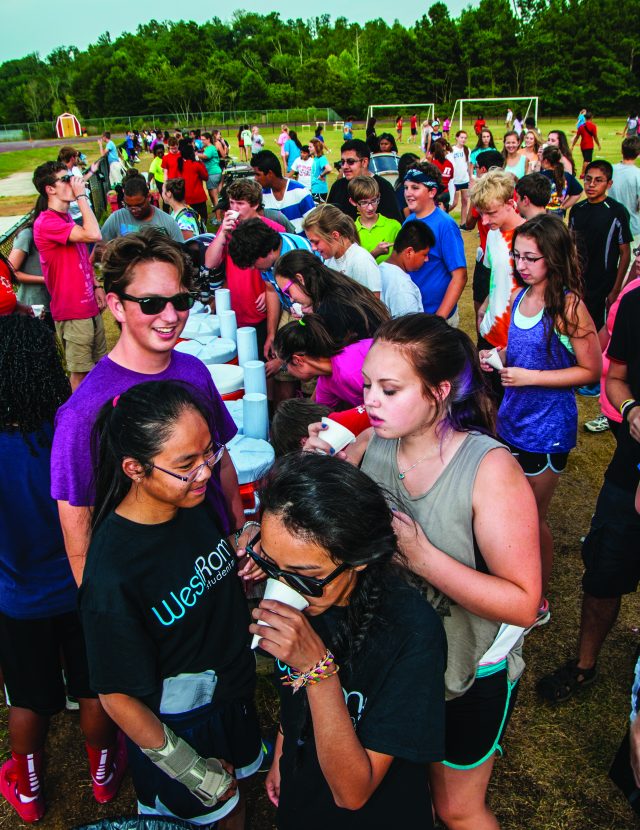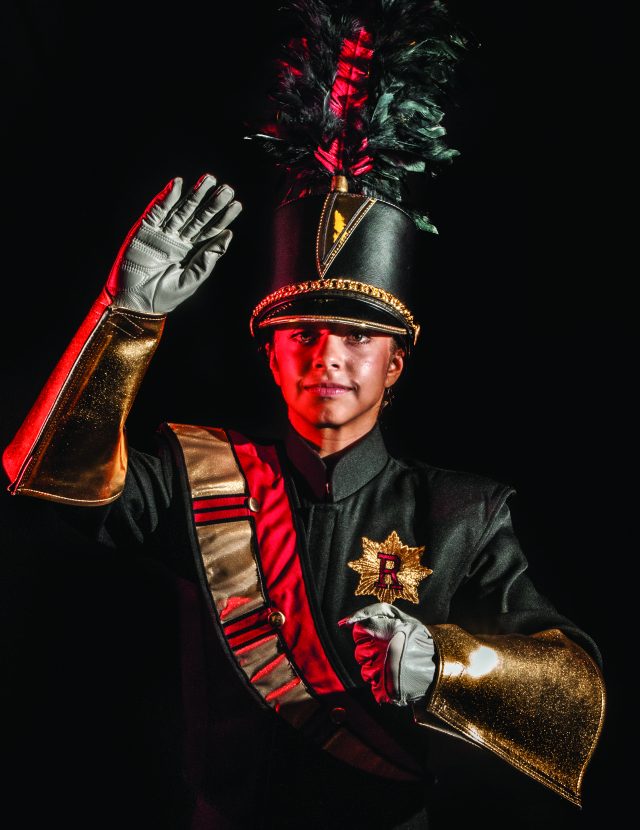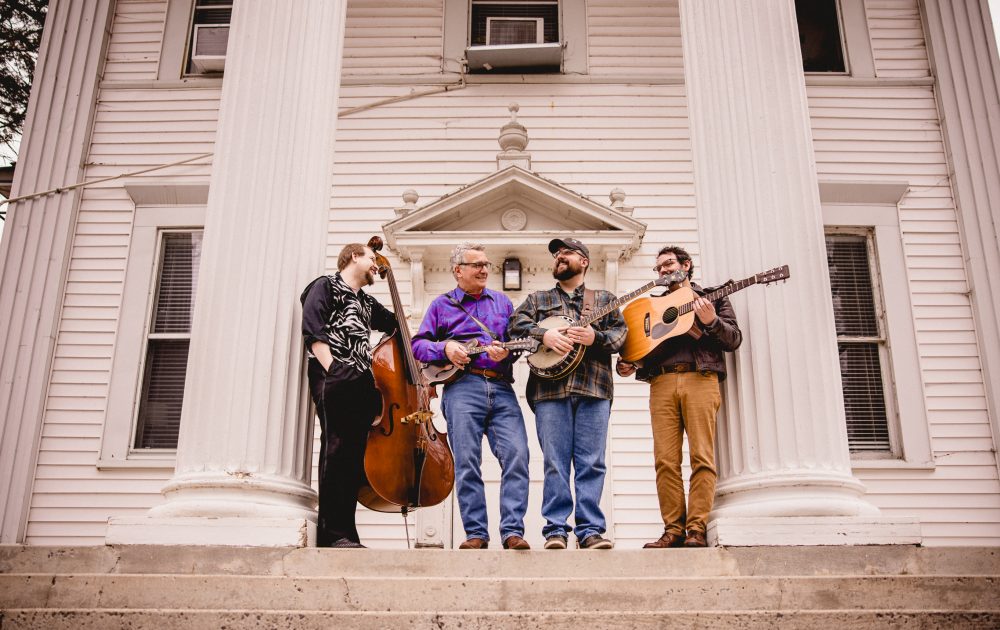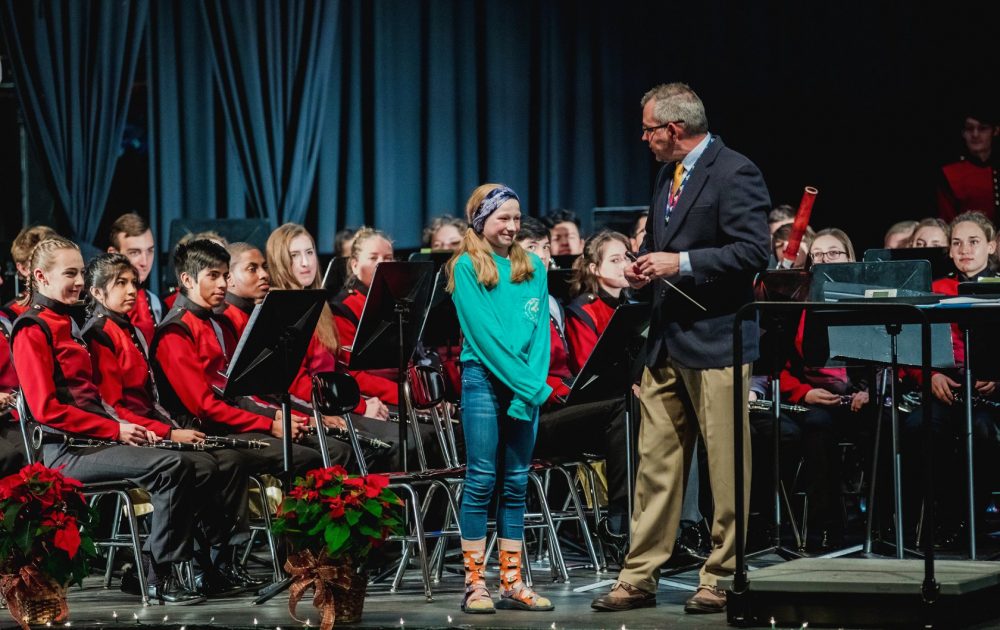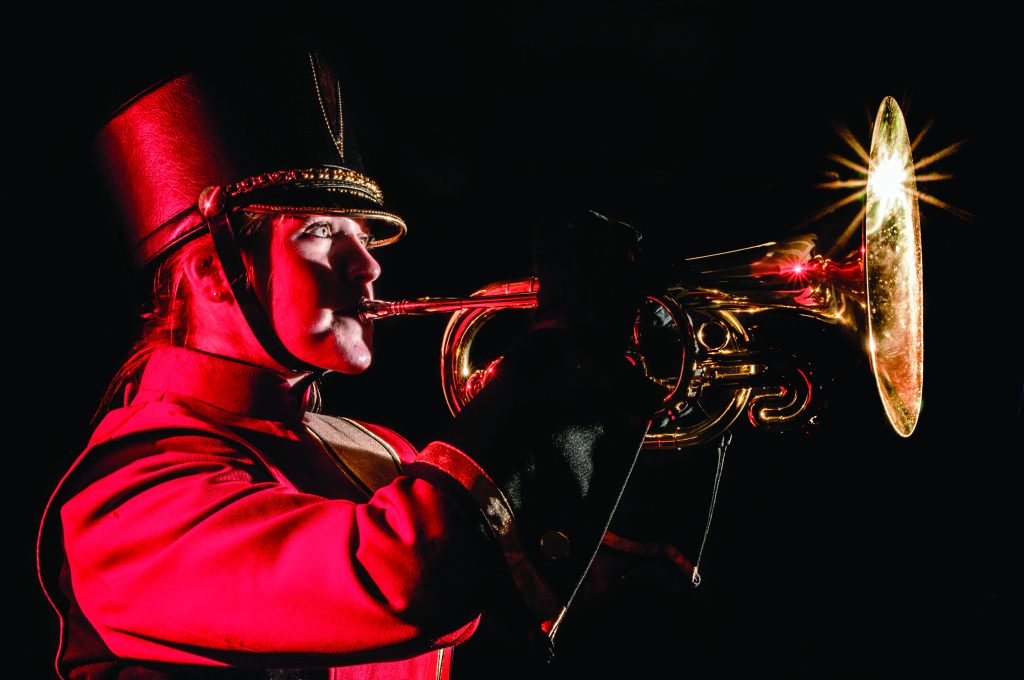
Photos by Derek Bell
During summer vacation, over 220 students return to Rome High School. Teenagers spread across the practice field, instruments in hand, learning to march and play symphonic pieces in tandem. From June 22 until the end of football season, their life is driven by a singular rhythm: The Sound of the Seven Hills.
There is no escaping the 95-degree heat on the field. Sweat dots the sheet music and the humidity soars higher than the clarinets’ notes. These students stand still, awaiting the next pattern. This is a physical and cerebral game. Enduring the swelter and holding a weighty instrument while performing marching maneuvers is one matter, but synchronizing steps with 219 others and playing complex musical pieces calls one to mentally muster focus. This is not an easy extracurricular.
What is it that brings over 200 kids together? Concert band in the winter could allow the sole musical outlet for expression and instrumental showmanship, yet this group spends five extra months outside parading. There must be something to it.
To many of these marching minstrels there is an intangible draw. One senior saxophonist, Marlee Smith, poignantly noted that the band becomes like family. “You spend so much time together you just get super close,” she said. “If you want to do something with [over] 200 of your closest friends, marching band is the thing to do. Most of my friends are in band. It’s a humongous, highly dysfunctional yet focused family.”
Flor Rangel, a sophomore drum major who also plays the clarinet, echoed this convivial sentiment. “I don’t like calling it ‘The’ band,” she said. “I call it ‘our’ band because we’re like a family. You see the same people every day, you get used to them, [and] everyone is really close.”
Unlike the blood that bonds her biological family, the familiar tie for her second family is their pursuit of a common interest. “We all share the same passion: which is to play music and entertain,” says Flor. “We don’t just entertain the crowds, we entertain ourselves.” Flor, who also drills in Rome’s Air Force JROTC, has been a part of band since sixth grade, and this closeness has been the hook that has kept her playing.
This, it seems, is the common allurement for most band students: a sense of belonging to something bigger than oneself, a second family.
Rome High’s new band director, Chad Hannah, is sympathetic to this internal lure. While the newsworthiness of having a fresh director for this storied program is noted, the angle that supersedes all news value is his heart for the kids in his band. Hannah, a tall, thin man with rectangular glasses, aims to take the program to new heights, yet not at the expense of neglecting that intangible draw.
“I have tried to build a family environment with the kids, regardless of their home lives,” says the Raggland, Ala. native. “When they’re home, they’re in real-life scenarios, like how [their parents] will make ends meet and other things. I want to make sure that the band program is a place where kids can be themselves, enjoy making music, enjoy the process and become better people. It’s their home away from home. We want them to want to be here.” This deeper purpose is Hannah’s driving rhythm, his heart and first goal for the program.
He aims to cultivate this atmosphere because of what band meant to him when he was in high school, he says. The former drum major of the Jacksonville State Marching Southerners sits back in his chair and looks off into the distance as he recalls the sanctity and safety his band family provided for him growing up.
“If you looked at me, [you] saw this middle class child, but what you didn’t know was that my dad may or may have been out of work,” Hannah explains. “[Sometimes] we didn’t have TV or AC. My parents were struggling to pay bills. It meant that not every afternoon was a pleasant time to be in the Hannah household growing up. Band and drum corps was a way for me to remove myself from the stress of real life. That is what it was: it was the safe haven.” Music was his outlet to make sense of life and the avenue through which he could lift himself to something better.
The familiarity and security of a close-knit program offer an environment where kids can grow. Next to creating a safe place, the individual betterment of his students is Hannah’s second priority.
He says that whether it’s through music or athletics, a main goal of any director or coach is to encourage and catalyze maturation for young adults. “When you get down to it past the eighth and quarter notes or the x’s and o’s [in a football play], we’re trying to shape better people to enter society,” he says. “When it’s all said and done, they will remember what we tried to teach him, regardless if it’s a sport or band.”
But apart from musical prowess, what is Hannah trying to teach, you may ask? For two and a half hours each day, his students practice playing music while marching in unison and it is this character of devotedness and commitment he hopes to instill in his students for the rest of their lives. “One common thread we all share [as band directors and coaches] is that we’re trying to create young adults that understand time management, dedication and values so that when they graduate high school they’re good citizens ready to conquer the world,” Hannah explains, using his hands for emphasis like he would conduct.
Discipline from hours of musical repetition and seemingly endless parading cement these values.
Every practice begins with 30 minutes of drill and music fundamentals, says Marlee, who is also band captain. Then marching ensues, instruments in hand. She says that once they learn “a good chunk” or phrase in the music, they’ll repeat it over and over. After the entire show is mapped out and perfected by all students, the band will rehearse the entire show – roughly 7-and-a-half minutes – four to five times a practice, she explains. This is repeated over the span of four months. If character building were a song, dedication would be this group’s chorus.
Not quite behind the scenes, more like Hannah’s assistant coaches are the three drum majors. These students are disciplined to keep the 200-plus marching formation on beat and in time with the music. These conductors are raised 10 feet off the ground, swishing their hands about in rhythm, and not only are they dedicated to the show; they encourage their fellow band mates to be as well. For two-and-a-half hours a day, the drum majors work hard in keeping the show on track; they are the pulse; they keep the family together. From learning the music and combining the musical scores to leading their fellows, these three students – all sophomores – do it all.
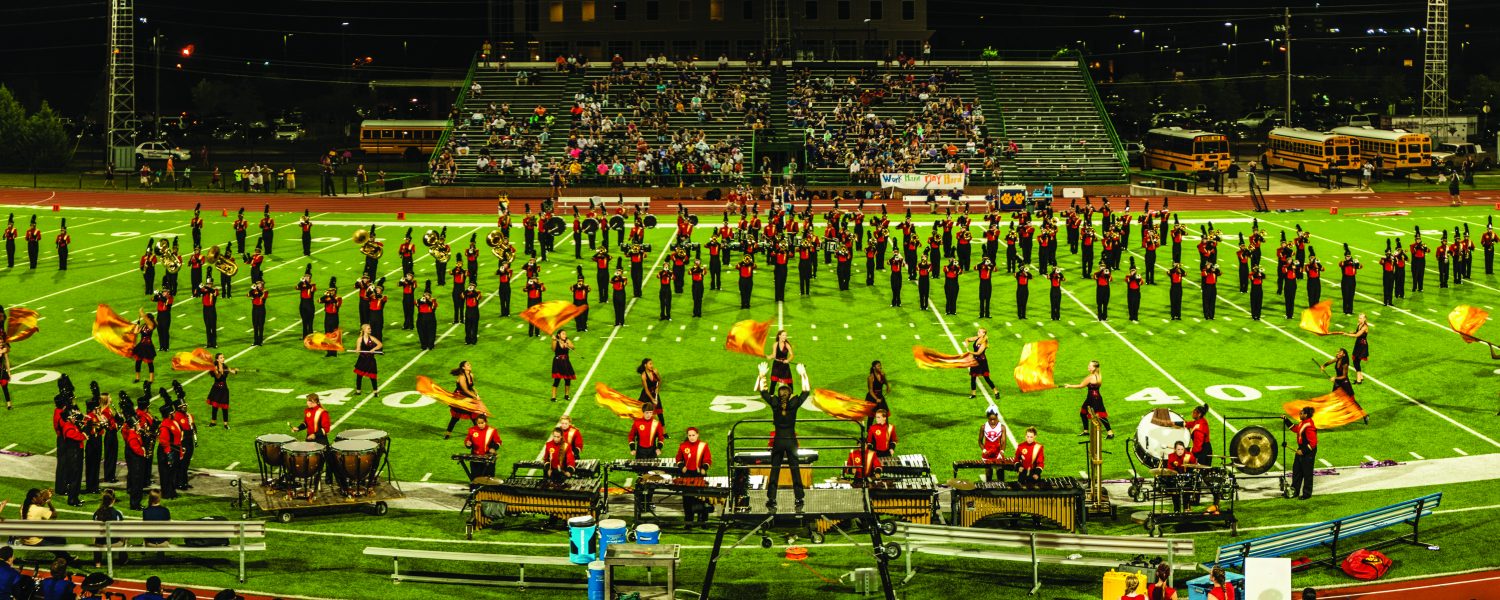
One drum major, Kathryn Nobles, epitomizes the hard work ethic instilled by Hannah’s detail-oriented regimen. “With three drum majors with different styles, one’s [conducting] might be larger or the width might be further, but we all have to look the same,” she explains. “[It’s] very uniform. We learn with the band. We watch Mr. Hannah; he does a crescendo here, so we add it in. [There is] a music score, so instead of one piece of music for a trumpet player, we have all instrument’s notes in one packet.” The trick is within the detail, it seems. It’s a very demanding position. “Our arms are always killing us,” Kathryn laughs.
Kathryn is also an Advance Placement student who also set the school swimming record in the 100-meter backstroke. It’s easy to see how her work ethic in band has informed other areas of her life. The safe, familiar atmosphere that Hannah helps to cultivate offers the students a place to grow and, as per his focus, become better people. “[Mr. Hannah] is very motivational,” Kathryn adds. “He has a lot of faith in us and tells us how much he appreciates us. It inspires us to work harder.”
This inspiration is the draw that calls kids to go to school in the summer and march. The common allurement to belong to a second family keeps these students in tune with a greater purpose and motivates them even on the tough days – and making music is fun, too.
“We tell the kids that they matter, they have a purpose and they belong while they are here,” Hannah smiles, his heart behind the program evident. “I want to make sure that while they’re here that they make a difference, belong and have a purpose. Music is just a tool.”

